Opa!
Where's the wine? Greek Festival gets drank dry as record crowd turns it into arollicking success
 The people kept coming at Houston's 44th-annual Greek Festival.Photo by Carolina Astrain
The people kept coming at Houston's 44th-annual Greek Festival.Photo by Carolina Astrain As always, the food was a huge draw.Photo by Carolina Astrain
As always, the food was a huge draw.Photo by Carolina Astrain
Houston's Greek Festival drew crowds even larger than anticipated all weekend, with organizers reporting an estimated total attendance of 40,000 people.
Parking was nightmarish near Annunciation Orthodox School in Montrose, but the weather made it worth it for most attendees. So many people came out to sample the fare that the 44th-annual festival sold out of signature Greek dinner plates Saturday evening and ran out of red wine on Sunday. Festival organizers expect to announce both a record crowd and food sales figure when everything is tallied.
Many attendees (myself included) came out two days in a row. Highlights included watching children's traditional Greek folk dancing and, of course, the food.
Not everyone in the surrounding neighborhood was as happy with the results, as cars blocked driveways and sidewalks. Tow-truck drivers did a brisk business hauling illegally parked cars away under the guidance of Houston police officers.
Did you go to Greek Festival this year?
Editor's note: Want more Greek Fest? KTRK Ch. 13 put together an extensive photo gallery of the weekend craziness.
